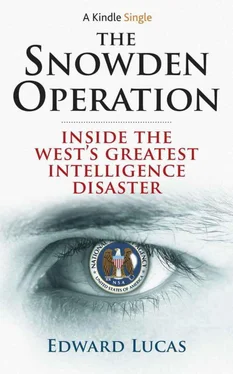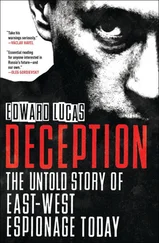It is worth noting that the Snowdenistas go far beyond the anti-nuclear campaigners in their thirst for damage. Disagreeing with your government’s actions is one thing. Sabotaging them is another. Imagine, for example, that a British or American anti-nuclear activist got hold of the acoustic signatures of his country’s nuclear submarines. These signatures—the noise that the vessels make under water—are among the most closely guarded of all defence secrets. They are distinctive and almost impossible to change. Once you know them, it becomes much easier to track a submarine and if necessary destroy it. Submarines’ effectiveness largely depends on their invisibility. So publishing the acoustic signatures of the nuclear submarines would be a simple and devastating way of making them useless—in effect, sabotage.
Such a move would cost the country concerned billions of dollars. It would also tip the strategic balance in favour of countries whose nuclear deterrent remained secret and effective. Even an anti-nuclear newspaper like the Guardian would decry such a move. Yet in effect, that is what Snowden and his allies have done. They have rendered ineffective some of their countries’ most expensive and sensitive defence capabilities, while leaving adversaries untouched.
Another lesson from the past concerns the scandal around the Echelon system for collecting information regarding international telecommunications. It was revealed in a series of leaks in the 1990s, eventually prompting a lengthy report by the European Parliament. [71] http://www.europarl.europa.eu/sides/getDoc.do?pubRef=-//EP//NONSGML+REPORT+A5-2001-0264+0+DOC+PDF+V0//EN&language=EN
John Schindler, a former NSA analyst who is now a professor at the Naval War College in Rhode Island, sees a parallel. The exposure of Echelon, he believes, was an ‘active measure’ by Russian intelligence, aimed at stoking distrust between America and its European allies. Without access to classified information, that link is unprovable. But the similarities are startling. Details of the programme were divulged by a disillusioned NSA contractor, Margaret Newsham (who was working for the defence company Lockheed). The story was highlighted by campaigning journalists in the UK and in New Zealand. At first sight the message seemed sensational. America and Britain, together with other close allies, were spying on the rest of the world. They had a global network of facilities which could intercept communications—in those days faxes and telexes, as well as phone calls and the nascent internet. All this seemed to be happening without public consent or political oversight.
The result was fury—especially as one of the journalists involved, Duncan Campbell, claimed that the spying was not just for reasons of statecraft, but also in pursuit of commercial goals. American companies were gaining an unfair advantage over their rivals thanks to the muscle of their intelligence services.
On closer scrutiny, the case largely fell apart. It was exciting to know the code words for the programmes concerned, and to have the supposedly top-secret locations listed, illustrated with maps, photographs and diagrams. The silent fury of the intelligence agencies added another note of drama, as did the self-righteous hysterics of European politicians.
Yet just as with the Snowden revelations, the disclosures were not in themselves surprising. Britain’s GCHQ and America’s NSA exist to collect electronic intelligence. It is hardly surprising that they strive to fulfil their missions. Nor should their close alliance be a surprise. Britain and America have been cooperating closely since the start of the Cold War (as anyone viewing a James Bond film knows).
The details—the means, nature and extent—of those activities and alliances are indeed secret, but for entirely understandable reasons. Intelligence agencies, as explained above, like to keep the other side guessing. Even seemingly unimportant information about budgets, spending plans, logistics and premises can be useful to the adversary, at a potentially high cost. A secret, once released, may be a shock to the unwitting. But a shock is not necessarily a scandal.
Nor could anyone prove that anything revealed in the Echelon disclosures was actually illegal. International law does not prohibit espionage. The national laws of Britain, America and other countries gave (and give) the intelligence and security agencies a remit, and set up a system of oversight. The remit may be too wide, and the oversight too flimsy (or perhaps vice versa: views differ), but these are matters for the political process to resolve.
Perhaps the gravest charge was that America conflated commercial espionage with statecraft. That would be shocking if true. It would be illegal under American law. It would confer unfair advantages on the lucky US companies that received intelligence titbits from the government, and disadvantage their competitors. It would discredit America’s reputation for fair dealing in the eyes of the rest of the world.
It is impossible to prove a negative. Those who believe that the American government and its corporate handmaidens (or Corporate America and its political handmaidens) are capable of any kind of iniquity will not be disabused of their convictions by mere denials, or the absence of facts to support them. But the campaigners against Echelon produced a remarkably thin case to support their contention. It is hardly surprising that American spies may target foreign companies. As Jim Woolsey, the former CIA director, explained in his newspaper article, they may be involved in bribery to gain an unfair advantage, or be breaking sanctions. They may have employees with access to state secrets, either now or potentially. Intelligence agencies are ingenious, curious and adaptive: that is what they are paid to be.
But the gap between spying on foreign companies and handing their commercial secrets to domestic ones is huge. And there is no evidence for it. The most likely explanation for this absence of evidence is that nothing of the kind is going on. Any programme of systematic intelligence sharing with the corporate sector would be simply too risky to contemplate (as well as being wrong). How would it be administered? Who would authorise the security clearances? How much information could be disclosed? And what about the competitors, who in litigious America would be likely to sue the government if they believed they were losing out on access to valuable information collected at taxpayers’ expense?
American companies do get plenty of help from their government. They can receive briefings from officials about political and economic conditions abroad (as do executives from any country with an effective foreign service). Favours may be given through indirect channels such as consulting firms, or by hiring recently retired officials from the intelligence community. Abuses do happen. But it is striking that none of the soi-disant whistleblowers from the NSA or elsewhere, and no conscience-stricken corporate executive anywhere, has given the slightest sign, hint or proof of any programme of state-sponsored commercial espionage, either in the Echelon era or now. By contrast, evidence abounds of such espionage by other countries, chiefly China but also, notably, France.
In assessing the effects of Snowden’s actions, it may help to imagine how the whole thing could have been done differently. The overwhelming evidence even from the cherry-picked documents released so far is that the NSA is a bureaucratic and rule-bound organisation. So the first thing that an employee or contractor should do when he encounters a breach in the rules is report it. The NSA, like GCHQ, has a system for this. In America, the Intelligence Community Whistleblower Protection Act of 1998 allows intelligence insiders to disclose classified information concerning a ‘serious or flagrant problem, abuse, [or] violation of law’ to members of congressional intelligence committees. They are obliged to exhaust other channels first, including the NSA’s inspector general and the attorney general.
Читать дальше












